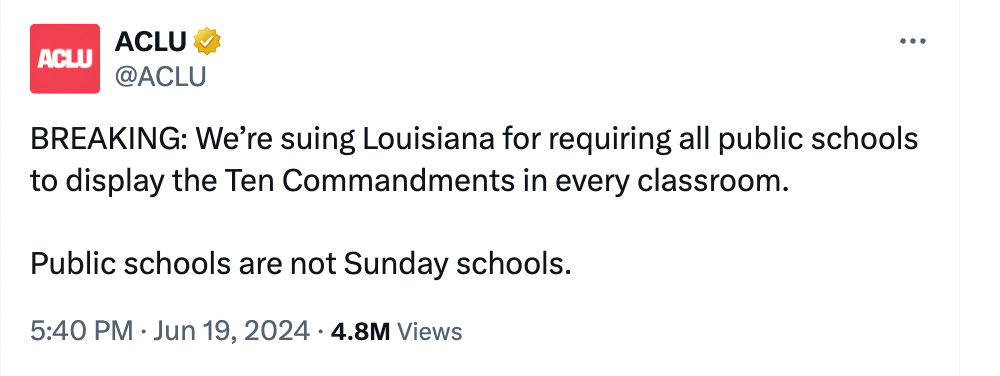SCOTUS. Today's Cases and What Comes Next. How about a side of religion with your public school education?
Thursday morning, the Supreme Court issued decisions in four cases, none of them involving Donald Trump. Nor were any of the other high profile cases we’ve been following on the docket this morning. That means cases about the power of administrative agencies, whether it’s constitutional to make it a crime for someone under a domestic protection order to possess a firearm, and whether hospitals are obligated to stabilize patients in emergency situations, including by providing an abortion where appropriate, are still on the docket.
In Louisiana (we’ll get to it in a minute), the state legislature has passed a law requiring that the Ten Commandments be posted in all public school classrooms. The law is clearly at odds with existing First Amendment jurisprudence, suggesting that passing it was a provocative act designed to get a test case to the Supreme Court to make classrooms Christian again.
And there’s still more for us to discuss. It was a day!
I was up bright and early in front of a camera, only to learn we have to wait at least until Friday morning, perhaps longer, to learn whether the Court believes Donald Trump is entitled to immunity from prosecution.
The Court will announce opinions again tomorrow, Friday morning, at 10:00 a.m. ET. Quick reminder: we never know which cases or how many of them we will get on a particular day.
Today the Court decided
Moore, where the Court held it was constitutional to charge U.S. taxpayers who own shares in foreign corporations a one-time tax on their share of earnings under a provision of the 2017 Tax Cuts and Jobs Act known as the “mandatory repatriation tax.”
Chiaverini, a case involving whether a defendant in a criminal case can raise a claim of malicious prosecution if one of several charges lodged against them turns out to be baseless. The Court held that the presence of some valid charges does not prevent a malicious prosecution claim on the basis of another, invalid charge.
Diaz, where the Court ruled prosecutors could offer expert testimony that "most people" in a certain group have a particular mental state. This case involved a drug courier and an expert who testified that most people transporting drugs know what they are doing.
Gonzalez, where the Court held that the 5th Circuit failed to apply the rules for evaluating a claim of retaliatory arrest properly and sent the case back to them to do so.
I flag these cases, which we haven’t previously discussed, to give you some sense that every case that makes its way to the Supreme Court is important. If we weren’t starring down the barrel of a possible second Trump presidency, these cases would be getting far more attention, particularly the ones about possible police misconduct and the kinds of evidence that can be used in criminal cases. But we continue to live in a timeline where Trump’s attack on democracy consumes far too much attention, distracting us from other critical issues. Removing Trump from our politics is essential to facing future challenges like climate change, criminal justice reform, Supreme Court reform, and restoring the right to vote, along with a host of other issues.
Seventeen cases remain on the Supreme Court’s docket. That means next week is going to be busy if the Court intends to finish up by the end of the month, its *normal* time—although they’ve gone into the first week of July several times in recent years. The Court’s website has been updated to show they will hand down more cases next Wednesday. That means it’s highly unlikely there will be additional dates before then although we can expect to see Thursday and perhaps even Friday dates again.
We know what’s left on the Court’s calendar for this term. But we also got a preview of a case that is likely headed to the Supreme Court in a future session. The First Amendment prohibits the establishment of any religion by government. Until recently, that’s meant in schools too. But with the new conservative supermajority on the Court, there has been some erosion of precedent.
The Louisiana Legislature passed a law on Wednesday designed to get the Court to expand the role of religion in the courtroom. The law requires a display of the Ten Commandments in every public school classroom, including at the college level. The display must be 11” x 14” poster, with the Commandments the central focus in a large and easily readable font. The display must include a three paragraph statement claiming the Ten Commandments have been a prominent part of American education for almost three centuries. What’s next? Racism was also a "prominent part" of American education for decades.
Nobody involved in passing this legislation thinks it complies with the law. There’s a 1980 case, Stone v. Graham, that’s directly on point. The Court invalidated a Kentucky law that required posting the Ten Commandments in classrooms, finding it violated the Establishment Clause of the Constitution. The Court found that the requirement "had no secular legislative purpose" and was "plainly religious in nature” because the Commandments involve religious matters like worshiping God and observing the Sabbath. Louisiana’s new religious mandate clearly violates the law.
This is what people with an agenda do when they think the Supreme Court is on their side. They know the law violates established interpretations of the First Amendment. But after Dobbs and the Supreme Court’s utter abandonment of precedent, why not feel emboldened? Why not try to get decades of precedent reversed while you can? These are, after all, the folks who in Project 2025, have signaled that education will be left to the states. That means eliminating the Department of Education and permitting states to opt out of federal programs or standards. A little Ten Commandments in the classroom goes nicely with that.
This Court has already signaled interest in advancing the role of religion (presumably, that’s limited to Christianity, and they’d find a way to prohibit postings of Sharia law or satanic practices) in earlier cases. Notably, in 2022, the Court considered whether a high school football coach could engage in post-game prayer on the field, with players and students gathered around him. The Bremerton School District told Joseph Kennedy, the praying coach, that he needed to stop so they wouldn’t be sued. He refused and doubled down, reaching out to local and national television, print media, and social media for support. The school district suspended him, and Kennedy sued.
After losing in the lower court, Kennedy won in the Supreme Court. Here’s how the conservative Federalist Society characterized the ruling: “The Free Exercise and Free Speech Clauses of the First Amendment protect an individual engaging in a personal religious observance from government reprisal; the Constitution neither mandates nor permits the government to suppress such religious expression. Justice Neil Gorsuch authored the majority opinion of the Court.” The Court ruled in Kennedy v. Bremerton that the coach’s prayer was a personal religious observance and that it would actually violate his First Amendment protections for free speech and free exercise of religion to prevent him from engaging in prayer on the field.
The ACLU took about 30 minutes to announce that it would be filing a lawsuit along with other groups next week.
What’s next if Louisiana gets away with this? Will the Chief Justice of a state supreme court plant a 2.5 ton granite monument of the Ten Commandments in the courthouse and refuse to remove it after he’s ordered to by the courts, saying that it serves as a reminder to lawyers and judges that justice could only be done if 'the favor and guidance of almighty God” was invoked first? Oh wait, that already happened in Alabama, where Chief Justice Roy Moore (you may remember him. He lost a Senate race against Doug Jones following a campaign where his interest in young girls came to light) refused to remove his rock from the rotunda of the Alabama Supreme Court after the Eleventh Circuit Court of Appeals directed him to. Following his refusal, Moore was removed from office and prosecuted by Alabama Attorney General Bill Pryor, who is now the Chief Judge on the Eleventh Circuit Court of Appeals, for judicial misconduct because he failed to comply with the order of the federal court.
The Kentucky case, Stone, the Bremerton School District case, and Roy Moore’s courthouse monument case all have one thing in common, the Lemon test. That test, used to determine whether the First Amendment’s establishment of religion clause has been violated, has been in place since the Court decided Lemon v. Kurtzman in 1971. A statute must pass all three prongs of the Lemon test to pass constitutional muster:
The statute must have a secular legislative purpose,
its principal or primary effect must be one that neither promotes nor inhibits religion, and
it must not foster “excessive government entanglement with religion.”
In the praying football coach case, the Supreme Court suggested Lemon had been “abandoned.” Now, it looks like Louisiana will ask the Court to formally overrule 40 years of precedent, permitting the Ten Commandments in classrooms, with who knows what else to follow. This is a situation to watch carefully. Its implications will affect people across the country in multiple ways, not just students in Louisiana’s classrooms. No child should feel like their religious beliefs, or lack of them, determine whether they're welcome in the classroom. No litigant should feel like they won’t receive impartial justice from a judge because they don’t stand to pray before court starts. This is a dangerous slippery slope.
One final note tonight: we here at Civil Discourse are not alone in being concerned about Judge Aileen Cannon’s ability to handle the Mar-a-Lago case. On the eve of her unusual hearing tomorrow, where amici will argue alongside lawyers regarding the constitutionality of the special counsel appointment mechanism, the New York Times has an extraordinary report. They reveal that two federal judges in Florida, including the chief judge in the Southern District of Florida where she sits, privately urged Judge Cannon to step aside when the classified documents case was randomly assigned to her. Cannon refused, which is how we ended up where we are.
Chief judges have no supervisory authority over the other judges on their courts. They cannot tell them what to do. But a wiser judge than Cannon would have listened to other judges on her court. This gives new impetus to concerns that there is more at work here than inexperience.
Another big day in store for us tomorrow!
We’re in this together,
Joyce






As an Episcopal priest, I stand firmly against this blending of church and state. And, I hope that it can be made clear that this is NOT a Christian text - this is from scripture revered by Jews, Muslims, and followers of Jesus. Finally - if they want to display the law, how about a copy of the US Constitution? Maybe they should actually read it.
When I was a child in the fifties, we were required to sing Christmas carols in school. I am Jewish and it always rankled me to have to sing about Jesus Christ--so much so that it still bothers me almost 70 years later. So it's not surprising that the thought of having someone else's religion shoved down my throat makes me want to fight. The people who behave this way have no idea what it feels like to be told how to believe. It's beyond repugnant. What nerve! I hope the Court does the right thing when they get the case, although I fear they won't.
Sent from my iPhone